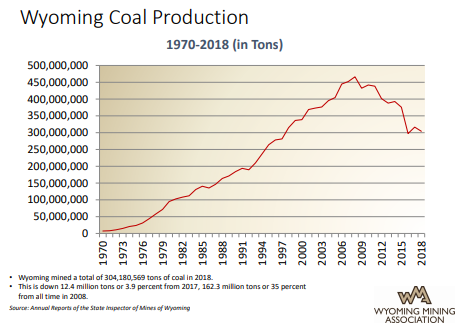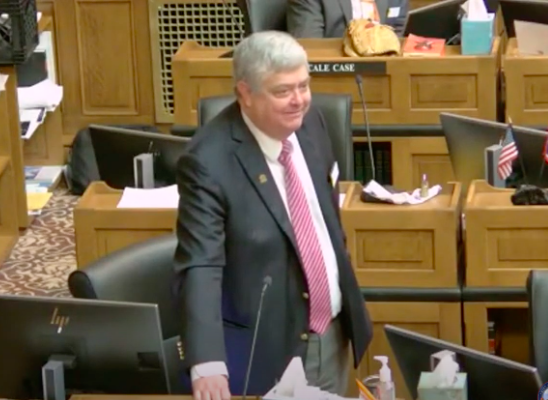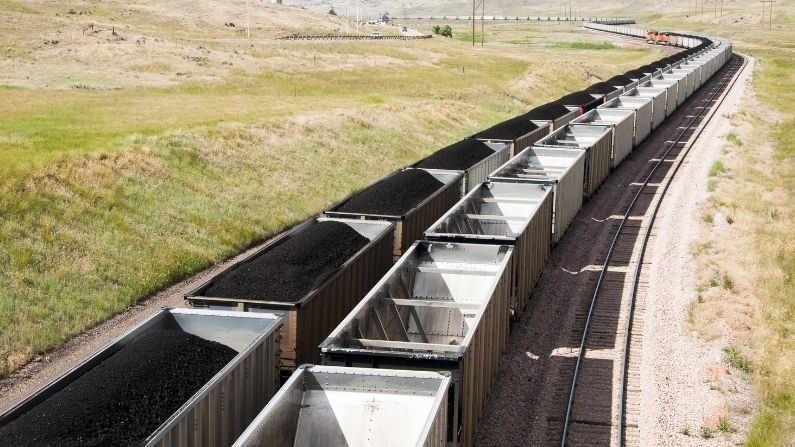Coal production peaked in the Cowboy State in 2008, when miners extracted over 466 metric tons of the black rock from the heart of Wyoming coal country. In 2020, the state’s annual yield fell to less than half that amount, according to the Wyoming State Geological Survey. Glen Murrell is a geologist by training. He predicts production will slightly rebound in 2021, but he said that the mammoth numbers of 2008 are probably a relic of the distant past.
“There is an impact of a very, you know, unforeseen sort of black swan event. That being COVID. It came in and hammered the economy in general. And that short-term demand was hit hard,” he said. “There is a far more significant long-term trend which is in place as well. And unfortunately, that does not look good.”

Wyoming coal production has been on a steady decline since its peak in 2008. 2019 and 2020 have continued this trend. (Courtesy of the Wyoming Mining Association)
Two major mines in the Powder River Basin announced closures this year, and there are already 40 percent fewer miners employed statewide compared to just a decade ago.
Murrell is also executive director of the Wyoming Energy Authority, a government-supported agency working closely with state Governor Mark Gordon and other major energy stakeholders. In that role, Murrell advocates for all aspects of the state’s energy industry, from coal to solar and wind.
“Wyoming intends to continue to power the nation,” he said. “We have contributed to the overall well-being of literally hundreds of millions of Americans over the last five decades through the provision of cheap and reliable energy. We want to continue to do that. We want to continue to do that within all of the above energy mix.”
That means investing in new technologies, like carbon capture, in the long-term, but also promoting renewables now. Because, like it or not, that’s where the energy economy is heading, according to Murrell.
“It doesn’t matter which market you’re looking at, whether it’s a California market or the Texas markets. One thing is quite clear across the market space and in North America,” he said. “Consumers have prevalence and expanding interest and desire and demand for low-emissions energy.”
Murrell has known about these trends for years. So have state lawmakers, but that hasn’t stopped them from trying to save the coal economy this legislative session. Several bills aimed at slowing coal’s decline in Wyoming passed both the State House and Senate, and gained approval from Governor Gordon. Several senators explained in a lengthy debate in late March why it’s so critical that these bills pass.
“Here we are, facing the loss of jobs. Facing the loss of communities as we know them,” said President of the Senate Dan Dockstader of Afton.
“For the love of coal. I love this bill, and the efforts to fight for it,” said Tara Nethercott of Cheyenne.
“We have to fight this fight. We have to spend the money to fight this fight. I can tell you that the people in my district demand it,” said Dave Kinskey of Sheridan.

Democratic Senator Mike Gierau of Jackson spoke in opposition of allocating funds to litigate coal lawsuits on March 29. (Screenshot courtesy of the Wyoming Legislature)
One of the bills that recently became law would put up more roadblocks for utility companies looking to close a power plant. Another would require state regulators to consider the socioeconomic costs of closing a utility plant before authorizing any action. And a third, signed into law by Governor Gordon Wednesday, would allocate $1.2 million dollars for the governor’s office to sue other states that impede Wyoming coal. Senator Mike Gierau of Jackson opposed that controversial lawsuit funding bill on the Senate floor.*
“I’m not so sure it’s a wise expenditure of our money right now,” he said. “We seem to be in a mode where we’re looking at all our expenses and cutting. But here we seem to take what the heart wants and put caution to the wind.”
Wyoming is already tied up in a lawsuit against the State of Washington after it blocked the development of a coal export terminal. The case was filed in the U.S. Supreme Court over a year ago, but no action has been taken since. Opponents of the litigation bill say it’s funding a losing battle in a tight budget year.
For his part, Murrell said none of the proposed laws can reverse economic trends. However, he sid they do protect the state’s interests under his organization’s mission to support all aspects of Wyoming’s economy—even the declining ones.
“We have a far brighter future ahead of us if we take proactive steps forward, rather than try to just bury our heads in the sand and pretend something’s not happening,” he said.
Coal use may be fading in the United States, but it was still increasing worldwide before the pandemic year. And Wyoming wants to play a part in global markets, particularly in Asia. Murrell said, even in the U.S., there will still be a place for coal in the near term.
“Is coal going away? No. It’s simply too cheap. It’s too abundant. We’re too good at extracting it for coal to ever disappear,” he said. “It’s always going to be a part of the energy mix in some way or form.”
Murrell also said that the decades-long renewable energy targets from governors and nations, while aspirational, are enormous undertakings given the current state of technology and the spatial footprint needed for some renewables, like wind.
But that won’t stop many leaders from trying. Governor Gordon recently announced a statewide goal to eliminate carbon pollution from the power sector by 2035—all while still supporting fossil fuel workers. That’s actually similar to President Joe Biden’s plan to achieve net-zero emissions by 2050, a goal he announced in late January.
“We need to be bold. So, let me be clear: That includes helping revitalizing the economies of coal, oil, and gas and power plant communities. We have to start by creating new good-paying jobs. Capping those abandoned wells, reclaiming mines, turning old brownfield sites in the new hubs of economic growth, creating new good-paying jobs in those communities where those workers live because they helped build this country,” he said.
Despite the shared interests of the state and national agendas, Wyoming is fighting the Biden administration over its moratorium on approving new oil and gas leases on federal land. The state is also pushing hard for national support for carbon capture, which may help keep coal extraction alive. In essence, Wyoming is indicating that it wants to do its part in fighting climate change. But it wants to do so under its own terms. Time will tell if economics, and politics, will favor Wyoming’s terms, or reject them.
*EDITOR’S NOTE 4/15/21 @ 11:20 a.m.: This story was updated to reflect the current status of several coal-related bills, which were recently signed into law by Governor Mark Gordon.






